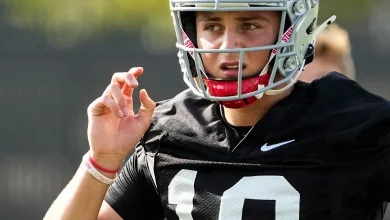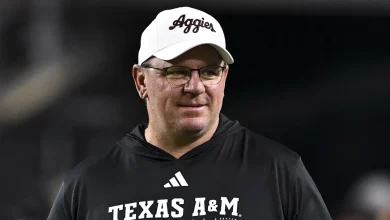As Texas Longhorns head into 2025 with high championship hopes, many question if Arch Manning has been unfairly set up to fail by media hype and pressure.

As the Texas Longhorns approach the 2025 college football season, expectations are soaring higher than ever. The program, with its storied history and passionate fan base, is viewed as a legitimate championship contender. At the center of this buzz is quarterback Arch Manning, the highly-touted recruit from a legendary football family, whose arrival at Texas has fueled both hope and scrutiny. While anticipation for his potential is justified, many critics and analysts question whether media hype and external pressures are unfairly setting Manning up for failure. Is the narrative around him creating an outsized burden, or is this just the natural course for a quarterback of his pedigree?
This analysis explores whether Arch Manning has been unfairly positioned as the savior of Texas football, the impact of media expectations on young athletes, and the broader implications for his development and performance in 2025.
The Weight of Expectations: A Legacy and a Hype Machine
Arch Manning’s name carries significant weight in college football. As a member of the Manning family—one of the most renowned dynasties in football history—he entered the spotlight early in his high school career. His grandfather, Archie Manning, and uncles, Peyton and Eli Manning, are NFL legends, and the family legacy has created a media narrative that he is destined for greatness.
The media’s fascination with Manning is amplified by his recruitment story, showcasing him as a generational talent. National outlets and college football analysts have projected him as a potential Heisman candidate even before stepping onto the field at Texas. This level of hype has created an environment where anything less than immediate success could be perceived as a disappointment.
Such expectations are not unique to Manning; many high-profile quarterbacks have faced intense scrutiny. However, the combination of his family legacy, early hype, and Texas’s recent championship aspirations has intensified the spotlight on him more than most. This creates a fertile ground for the question: has he been set up to fail by the narrative that surrounds him?
Media Hype and Its Impact on Young Athletes
The role of media in shaping expectations can be complicated. On one hand, coverage can boost a player’s confidence, increase visibility, and draw support. On the other, it can create a pressure-cooker environment where failure is magnified and setbacks are scrutinized more harshly.
For a young athlete like Manning, who is still developing physically, mentally, and emotionally, the weight of expectations can be overwhelming. The constant media focus can lead to:
- Unrealistic Pressure: Athletes are often expected to perform flawlessly immediately, disregarding the natural progression of skill development.
- Mental Strain: The constant comparison to family members or past legends can affect confidence and mental health.
- Media-Induced Anxiety: The fear of making mistakes under the microscope can hinder performance.
Research indicates that high-pressure environments can negatively impact young athletes’ performance, especially when expectations are sky-high. The narrative that Manning must instantly elevate Texas to national prominence may inadvertently hinder his growth by creating an environment where mistakes are viewed as failures rather than learning opportunities.
Is the Narrative Fair or Overinflated?
Critics argue that the hype surrounding Manning is disproportionate to his current experience level. Coming into the college game, Manning has limited playing time and experience compared to established quarterbacks. Expecting him to immediately transform Texas into a championship-winning team might be unreasonable.
Historically, many successful college quarterbacks have faced similar pressures early in their careers:
- Tua Tagovailoa at Alabama faced immense expectations, but it took time for him to develop into a Heisman finalist.
- Kyler Murray and Joe Burrow also experienced periods of adjustment before reaching their peak performance.
In this context, the media’s portrayal of Manning as a savior may be overinflated. While he undoubtedly has talent, football is a team sport, and success depends on many factors beyond the quarterback. Overhyping individual players risks setting them up for disappointment if those expectations aren’t immediately met.
The Potential Consequences of Unrealistic Expectations
If Manning is perceived as failing to meet the high standards set by media narratives, it could have several negative consequences:
- Loss of Confidence: Constant criticism might undermine his belief in his abilities.
- Increased Scrutiny: Media and fan expectations can intensify if early struggles are highlighted disproportionately.
- Burnout: The pressure to perform under relentless scrutiny can lead to mental exhaustion, affecting future performance.
- Impact on Development: Overemphasis on immediate results could rush his growth, potentially leading to mistakes that could have been mitigated with patience.
However, it’s also possible that Manning’s resilience, support system, and coaching staff will help him navigate these pressures effectively.
The Role of Coaching and Support Systems
A critical factor in whether Manning will succeed or struggle under the hype is the support he receives from coaches, teammates, and mentors. A healthy environment that emphasizes growth, patience, and learning can help mitigate external pressures.
Texas head coach Steve Sarkisian has publicly expressed confidence in Manning’s development and emphasized patience. If the coaching staff manages expectations well, focusing on Manning’s growth rather than immediate results, it can help him thrive despite external pressures.
Balancing Expectations and Reality
The key to ensuring Manning’s development remains on track is balancing expectations with reality. Fans and media should appreciate his talent without placing unfair burdens on him. Recognizing that college football is a team sport, and that development takes time, is essential.
For Manning himself, understanding that setbacks are part of the journey will be vital. Embracing a growth mindset—viewing mistakes as learning opportunities—can help him navigate the pressures and grow into the player Texas and the nation hope he will become.
The Broader Context: Is This Unique?
Manning’s situation is not unprecedented. Many high-profile athletes have faced similar narratives, including:
- Johnny Manziel at Texas A&M
- Trevor Lawrence before his college debut
- Zion Williamson in college basketball
In each case, media hype played a role in shaping expectations. Some athletes thrive under pressure, leveraging it as motivation. Others struggle when the weight becomes overwhelming.
Is Manning Being Set Up to Fail?
Ultimately, whether Arch Manning is unfairly set up to fail depends on perspective. While the media’s enthusiasm and high expectations are rooted in his undeniable talent and football pedigree, they can also become a double-edged sword.
If expectations are managed carefully, with a focus on his growth and development rather than immediate supremacy, Manning can thrive. However, if the narrative continues to portray him as the sole reason for Texas’s success or failure, the risk of burnout, disappointment, and underperformance increases.
In conclusion, Manning’s journey at Texas will be shaped not only by his talent but also by how media, coaches, fans, and he himself manage the hype. Recognizing the difference between healthy support and unrealistic pressure is crucial. With the right environment, Manning can fulfill his potential without being unfairly set up to fail.









